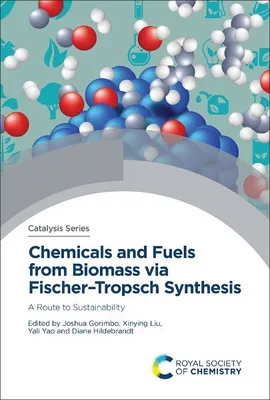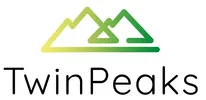Invitation to the Seminar “Hydrogen Technologies for a Sustainable Energy System”
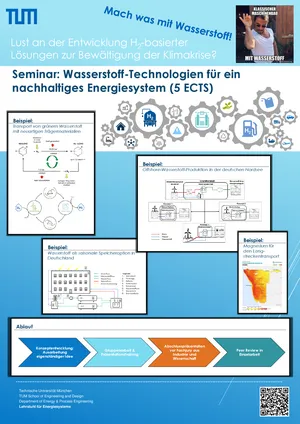
We warmly invite all students to our seminar “Hydrogen Technologies for a Sustainable Energy System.” The event offers the opportunity to work hands-on with innovative solutions for a sustainable energy future and to deepen your knowledge in a highly relevant field.
The seminar will cover the following key topics and activities:
- Development of Own Concepts: Independently develop innovative ideas for the application of hydrogen in sustainable energy systems.
- Critical Reflection in Teams: In small groups, the developed concepts will be presented, analyzed, and critically questioned – an exciting exchange to improve and further develop the ideas.
- Presentation Training and Final Presentation: Professional presentation training will prepare you to convincingly present your concept to a jury of industry and academia during the final presentation.
- Practical Scientific Work: Through a peer-review process, you will have the opportunity to experience scientific work up close and refine your concept through feedback from your fellow students.
Take this chance to acquire new skills, gain experience in scientific work, and expand your network in the field of sustainable energy technologies.
We look forward to your participation!
New Publication: Benchmark of Mixed-Integer Linear Programming Formulations for District Heating Network Design
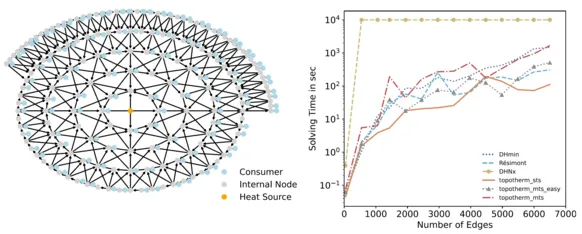
Our latest paper, Benchmark of Mixed-Integer Linear Programming Formulations for District Heating Network Design, explored how different optimization frameworks handle routing and investment decisions in large district heating systems. These decisions are crucial for reducing the high investment costs associated with district heating networks but come with significant computational challenges.
Our research benchmarked four mixed-integer linear optimization frameworks - Résimont, DHmin, DHNx, and our newly developed open-source tool, topotherm. We tested them on synthetic benchmarks and real-world urban districts with up to 9,587 potential edges. Some key takeaways are:
- Topotherm demonstrated the best computational performance when optimizing a single time step.
- Fewer integer variables don’t always lead to faster solving times.
- Introducing redundant binary variables, which add symmetry to the constraints, can slow the optimization.
Check out the entire open-access paper here:
https://www.sciencedirect.com/science/article/pii/S0360544224026598
Follow the development of topotherm at:
https://github.com/jylambert/topotherm
Contact: Jerry Lambert, Amedeo Ceruti, Benedikt Schweiger
Munich Hydrogen Symposiums (MH2S) 2024 (copy 1)
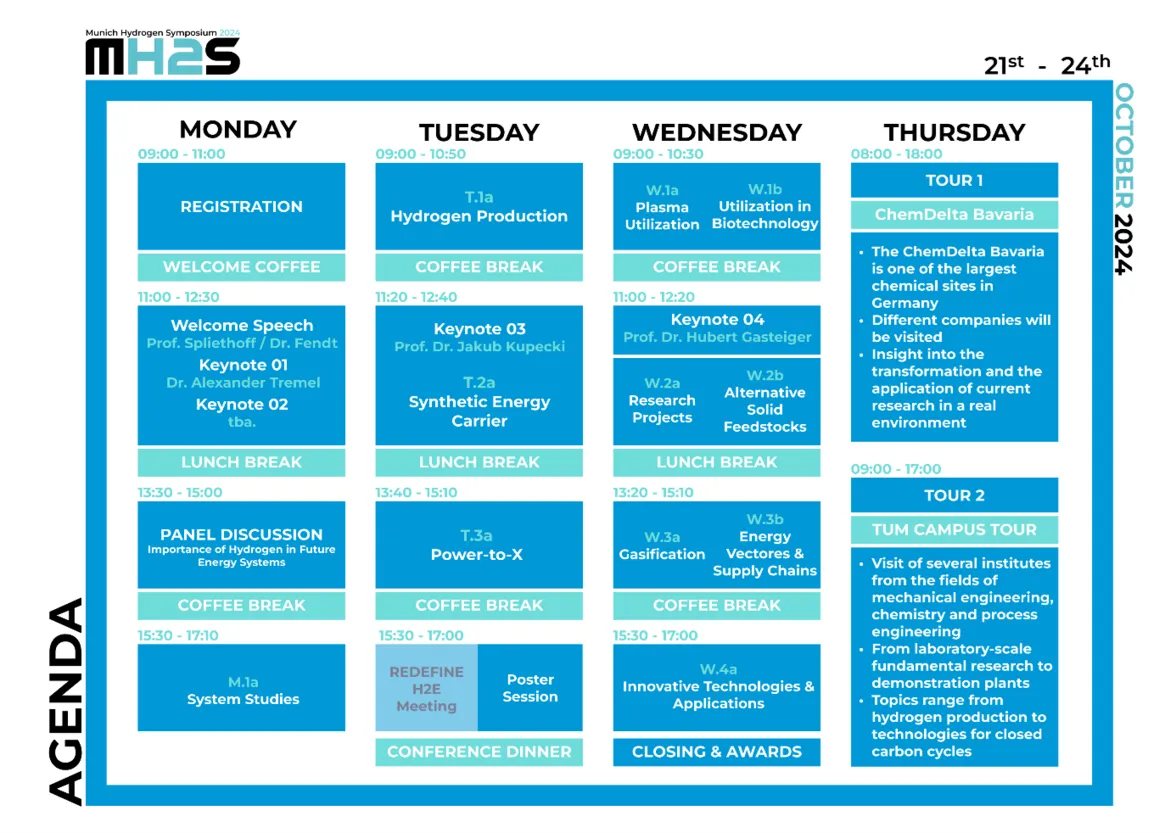
This year once again the Munich Hydrogen Symposium (MH2S), organized by the Chair of Energy Systems, is taking place. Be part of the MH2S 2024, where industry leaders, researchers, and enthusiasts will meet to explore and shape the future of hydrogen sustainability. This year's symposium will focus on the opportunities that hydrogen offers to transform the chemical industry. Have we caught your interest? Then register now as a participant: Registration Link. You missed the abstract submission deadline, please feel free to contact us via email.
Date: October 21st-24th, 2024
Location: Science Congress Center Munich, TUM Research Campus Garching
Event website: Website Link
Agenda: Detailed Agenda Link
Contact: h2symposium.les(at)ed.tum.de
New Publication: A two-phase nonlinear optimization method for routing and sizing district heating systems

In our new open-access paper (available at https://doi.org/10.1016/j.energy.2024.131843), we introduce a novel method to determine the optimal topology, pipe sizing, and operational parameters for district heating systems. The two-phase method combines mixed-integer linear programming (MILP) and nonlinear optimization for efficient network topologies:
Phase 1: Using MILP, we optimize the system with continuous diameters, linearizing nonlinear pressure and temperature dependencies.
Phase 2: The resulting topology and diameters are further refined using nonlinear sequential quadratic programming, employing penalization of intermediate diameters to achieve near-discrete diameter choices.
As proof of concept, a district heating network for a small town with 400 consumers is optimized in just 251.68 seconds.
Contact: Jerry Lambert, Benedikt Schweiger
New publication: Sustainable chemicals and fuels for the green transformation- Electrification of biomass utilization
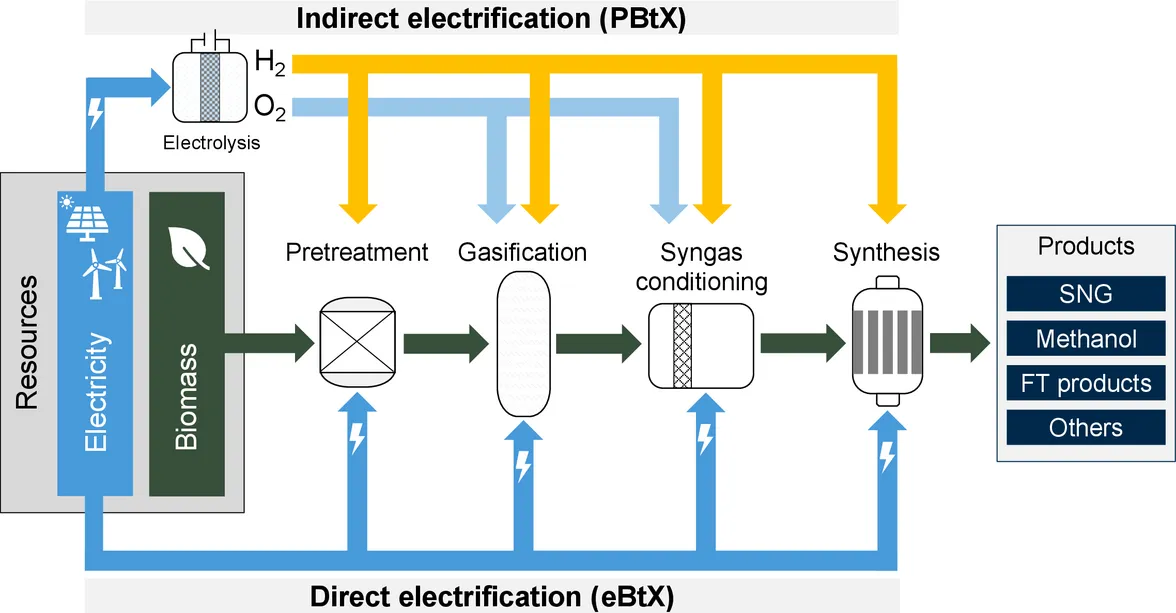
To defossilize sectors and industries such as heavy transport, air traffic and the chemical industry, green alternatives to today's oil and gas-based products will be needed in the future. The Chair of Energy Systems (CES) is focusing on biomass-based chemicals and fuels, as these are a direct substitute for fossil resources and are essential for reducing anthropogenic greenhouse gas emissions. With its current review paper on the electrification of Biomass-to-X processes (BtX), the LES is proposing a promising direction.
The focus of the production processes outlined is biomass gasification - a proven process pathway known as Biomass-to-X (BtX), with applications in catalytic synthesis to produce green chemicals and fuels. Since biomass is a finite resource, product yield must be maximized for efficient use. Electrification is a promising route that offers several advantages over conventional BtX and electricity-based processes (Power-to-X, PtX). Electrification options are divided into direct and indirect processes. While in indirect processes hydrogen from water electrolysis is fed into the process (Power-and-Biomass-to-X, PBtX), in direct electrification (eBtX) electricity is integrated into certain process steps and offers high efficiency by converting electricity into various forms of energy such as heat, electrochemical energy or plasma.
In the CES analysis, various electrification options are examined with regard to their process yield and maturity, technological feasibility, plant location, footprint and dynamic operation. In particular, the addition of hydrogen to PBtX processes is the focus of interest, as it offers significantly improved carbon efficiency and product yield. The technology has a high level of technological maturity, and the system and process advantages are supported by extensive simulation work in the literature. However, a research gap in direct electrification (eBtX) is pointed out, indicating a lower level of technological maturity and a lack of comprehensive studies at both plant and system level.
DOI: 10.1039/D3EE02876C (Review Article)
Kontakt: Marcel Dossow, Sebastian Fendt
New Publication: Entrained Flow Gasification-based Biomass-to-X Processes: A Techno-Economic Assessment

A recent study, sheds light on the significant role biomass can play in the transition to sustainable energy. The research delves into various biomass-to-x pathways, comparing six key products derived from entrained flow gasification. Methanol emerges as a promising option with low costs, while hydrogen-based products require a comprehensive evaluation, especially in the context of CO2 abatement costs. This study underscores the importance of strategic planning for a sustainable and economically viable shift towards biomass-derived synthetic fuels. Link to the paper
Gemeinsame Anstrengungen in Brasilien - REDFINE H2E Roadshow und UFRJ-LES BayIntAn Workshop schmieden zukünftige Zusammenarbeit für Innovationen
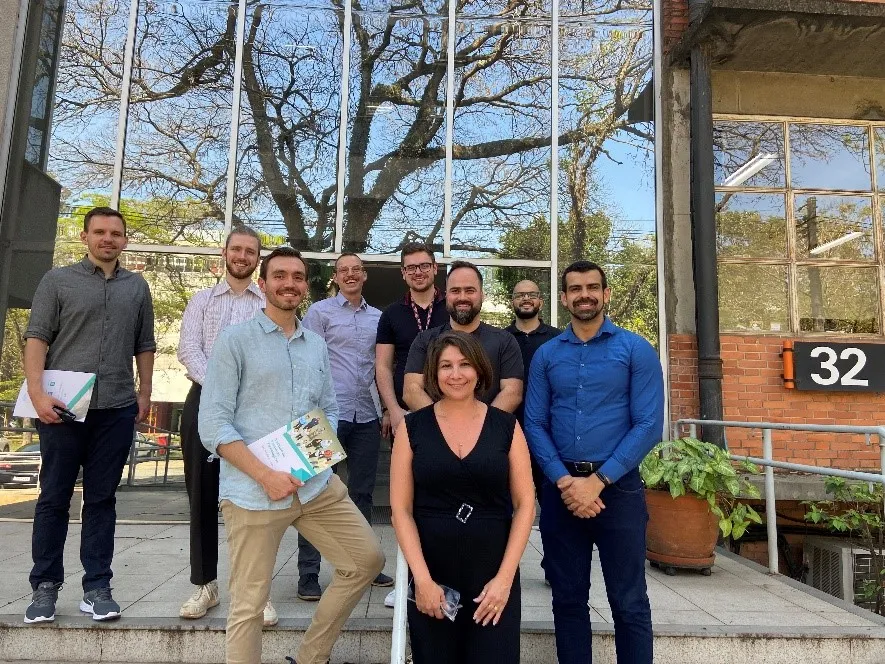
Deutsch-brasilianische Innovationskooperation in der grünen Energie- und Wasserstoffforschung
11. – 21. September 2023
Auf dem Weg hin zu nachhaltiger Energieinnovation veranstaltete der TUM-Lehrstuhl für Energiesysteme kürzlich eine Roadshow im Rahmen des Internationalen Zukunftslabors REDEFINE H2E im Süden Brasiliens. Die Roadshow diente deutschen und brasilianischen Forschern als Plattform, um Möglichkeiten der Zusammenarbeit auszuloten, insbesondere in den Bereichen Power-to-X, Wasserstofferzeugung und nachhaltige Flugkraftstoffe (SAF) aus Biomasse.
Die Initiative steht im Einklang mit den strategischen Zielen des REDFINE H2E-Projekts, bei der dem TUM-Lehrstuhl für Energiesysteme Partnerschaften mit prominenten Institutionen im Energiesektor geschlossen hat. Während der Roadshow vom 11. bis 15. September 2023 besuchte das TUM-Team wichtige brasilianische Partner, darunter das Instituto de Pesquisas Tecnológicas (IPT), die Universität von Campinas (UNICAMP, ebenfalls im REDEFINE Strateg ic Advisory Board vertreten), das Centro Nacional de Pesquisa em Energia e Materiais (CNPEM) und die Bundesuniversität von Rio de Janeiro (UFRJ).
Die gemeinsamen Anstrengungen deutscher und brasilianischer Forscher in Verbindung mit dem REDEFINE H2E International Future Laboratory umfassen verschiedene Forschungsbereiche entlang der gesamten Wasserstoff-Wertschöpfungskette. Dazu gehören die elektrisch unterstützte Vergasung (e-gas), reversible Festoxidzellen (rSOC), die biokatalytische Synthese (Biocat) sowie die sorgfältige Betrachtung und Modellierung auf Systemebene (SLAM) zur Optimierung der gesamten Wasserstoff-Wertschöpfungskette.
Die Roadshow wurde durch einen gemeinsamen Workshop mit der UFRJ im Rahmen des BayIntAn-Projekts ergänzt. Dieser Workshop, der vom 18. bis 21. September 2023 am Institut Alberto Luiz Coimbra de Pós-Graduação e Pesquisa de Engenharia (COPPE) der UFRJ stattfand, stand ganz im Zeichen der Zusammenarbeit zwischen deutschen und brasilianischen Experten. Ziel dieser interdisziplinären Zusammenarbeit war es, innovative Lösungen für eine nachhaltige Zukunft zu entwickeln, indem der Wissensaustausch zwischen Wissenschaftlern aus den Bereichen Wasserstoff, erneuerbare Energien und chemische Verfahrenstechnik gefördert wurde.
Unter anderem nahmen Partner des Instituts für Energieplanung (PPE) an dem 4 tägigen Workshop teil. Die Gruppe ist auf Lebenszyklusanalysen (LCA) und die Entwicklung von Geschäftsfällen spezialisiert. Das Laboratory of Nano and Microfluidics and Microsystems stellte ihr bahnbrechendes Projekt "enerGente" am Fachbereich Maschinenbau vor, das solarthermisch betriebene Entsalzung mit integrierter Wasserstofferzeugung kombiniert. Dieses Projekt steht im Einklang mit dem Schwerpunkt auf nachhaltigen Technologien und alternativen Energielösungen und war daher ein zentraler Bestandteil der Diskussionen. Der Workshop fand auch im Fachbereich Chemieingenieurwesen statt, wo Experten für numerische Strömungsmechanik (CFD), angewandte Thermodynamik und Themen wie Wasserstoffderivate, C1-Folgechemie, Katalysatortests und Biomassepyrolyse aufschlussreiche Diskussionen führten.
Die Zusammenarbeit zeigt das Engagement für die Gestaltung der Zukunft nachhaltiger Energielösungen und das große Interesse an der Förderung enger Partnerschaften auf diesem Gebiet. Der TUM-Lehrstuhl für Energiesysteme bedankt sich bei allen Partnern und Förderern, die zum Erfolg dieser Initiativen beigetragen haben.
Das Bundesministerium für Bildung und Forschung (BMWF) fördert das Projekt REDEFINE H2E unter dem Förderkennzeichen 01DD21005.
Der Workshop zwischen TUM-LES und COPPE-UFRJ wurde durch die Bayerische Forschungsallianz unter dem Förderkennzeichen BayIntAn_TUM_2023_116 im Rahme des Bayerischen Hochschulförderprogramms zur Anbahnung und Vertiefung internationaler Forschungskooperationen gefördert.
Hydrogen research project launched in Bavaria's 'Chemical Triangle'
Over 50 million euros for climate-neutral transformation of the chemical industry
Southeastern Bavaria's 'Chemical Triangle' region will be the future home to research on the climate-neutral transformation of Germany's entire chemical industry. The main focus will be on the use of hydrogen as an energy source and as a raw material for important commodity chemicals. The German Federal Ministry of Education and Research (BMBF) is funding the "Alliance Project H2 Living Laboratory Burghausen" with approximately 39 million euros. Industry partners will provide an additional 12 million euros. The Technical University of Munich (TUM) will take over scientific leadership of the alliance.
For information here.
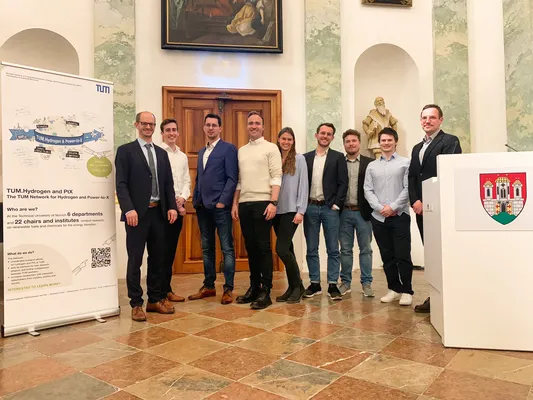
Sustainable aviation fuel from biomass via gasification and Fischer-Tropsch synthesis - new book chapter now available
Global aviation growth is set to continue in the coming decades, and the most promising strategy for reducing greenhouse gas emissions from aviation is the use of sustainable aviation fuel (SAF).
The so-called biomass-to-liquid (BtL) process is considered the most promising of several process pathways for producing SAF. In this process, syngas is converted into long-chain hydrocarbons by Fischer-Tropsch synthesis (FTS). SAF produced by FTS is considered a drop-in fuel, which means that existing aircraft can run on SAF without technical modifications. In addition, the use of sustainable biomass residues shows a high potential for emission reduction.
In the newly published book chapter "Sustainable Aviation Fuel from Biomass via Gasification and Fischer-Tropsch Synthesis" from "Chemicals and Fuels from Biomass via Fischer-Tropsch Synthesis: A Route to Sustainability", the specific BtL-FT route to produce SAF is described. This consists of torrefaction of lignocellulosic biomass residues, oxygen-blown entrained flow gasification, gas processing, and FTS, and yields liquid hydrocarbon fuels with high selectivity for SAF for further upgrading. Modeling of different pathway configurations-including integration of materials and heat and variation of process parameters-shows the potential of the BtL-FT pathway to produce SAF efficiently in both the short and medium term.
Neue Veröffentlichung des LES untersucht die Herstellung von nachhaltigem Methanol mit Hilfe von Membranreaktoren
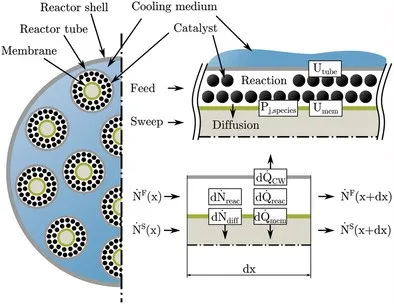
In einer neuen Veröffentlichung im Journal „Advanced Sustainable Systems“ mit dem Titel „Performance Requirements of Membrane Reactors for the Application in Renewable Methanol Synthesis: A Techno-Economic Assessment“ betrachten die Autoren die Herstellung von erneuerbarem Methanol mit Hilfe von Membranreaktoren. Zu diesem Zweck wurde ein 1-D Python Modell des Membranreaktors mit der Prozesssimulationssoftware Aspen Plus gekoppelt und Parameterstudien durchgeführt. Anschließend wurden die Ergebnisse in einer techno-ökonomischen Bewertung genutzt. Die Ergebnisse verdeutlichen, dass Membranreaktoren zwar Kosten reduzieren können bei der Methanol Synthese, jedoch muss für diesen Zweck die Wasserstoffpermeanz gering gehalten und eine hohe Wasserpermeanz erreicht werden. Außerdem muss die Membran bei Lebensdauern von etwa 2 Jahren unter 1000€ pro m² kosten.
Artikel verfügbar unter (open access): https://doi.org/10.1002/adsu.202200254
Kontakt: Vincent Dieterich
GOLD project: TUM Horizon 2020 delegation visits Canadian partners and technical meeting in France
Within the framework of the EU Horizon 2020 project GOLD on phytoremediation of contaminated soils and sustainable biofuel production (https://www.gold-h2020.eu/the-project), partners of the Chair of Energy Systems at TU München (https://www.epe.ed.tum.de/en/es/research/projects/gold) visited the Canadian project partners of the Université de Sherbrooke in Quebec (https://www.usherbrooke.ca/genie-chimique-biotech/departement/professeurs/nicolas-abatzoglou, https://www.usherbrooke.ca/genie-chimique-biotech/departement/professeurs/ines-esma-achouri). In addition to the project-specific exchange on research questions of fuel production from contaminated biomasses, the meeting focused on the exchange of content on future research topics and the intensification of international cooperation, especially between Europe and Canada.
After a fruitful first year in the GOLD project, with successful pot trials and sowing of the energy crops selected in the project, a first technical meeting in person took place in Lille, France, at the invitation of the project partner JUNIA. In addition to the status updates of the individual GOLD partners on the optimization of selected high-yielding crops for phytoremediation purposes and the conversion processes to clean biofuels with low ILUC risks, the upcoming activities to optimize the value chain bridging the gap between phytoremediation and biofuels were also the topic of the meeting.
The highlight of the meeting was the visit to the former MetalEurope Nord smelting site in Pas-de-Calais, which after its closure had been one of the most polluted sites in Europe. As one of five sites in the EU and seven worldwide (https://www.gold-h2020.eu/pilot-sites), the use of energy crops to phytoremediate these contaminated soils is being studied there as part of the GOLD project.
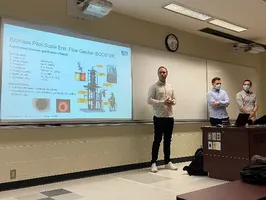
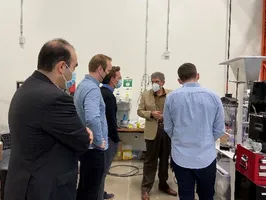

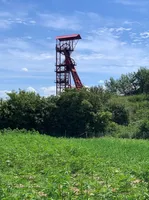
LES erforscht chemisches Recycling von Kunststoffabfällen mittels Flugstrom- und Plasmavergasung
Der Lehrstuhl für Energiesysteme trägt bereits seit einigen Jahren einen wissenschaftlichen und technologischen Beitrag zur Energiewende bei. Neben der Energietechnik nimmt nun auch der Rohstoffwandel eine größere Rolle in der Forschung des LES ein. Aktuell wird der Großteil kunststoffhaltiger Abfälle in Feuerungsanlagen oder Kraftwerken thermisch genutzt, wobei fossiles CO2 freigesetzt wird. Mechanisches Recycling von Kunststoffen stellt zwar ein wichtiges Verfahren zur Einsparung von Rohstoffen dar, allerdings ist die Rezyklierungsrate des Kohlenstoffes begrenzt, es kommt zu einer Verschlechterung der Werkstoffeigenschaften und nur homogene Stoffströme können zurückgeführt werden. Für stark heterogene Gemischkunststoffabfälle aus Industrie und Haushalte sind vielversprechendere Recyclingtechnologien erforderlich.
Eine attraktive Möglichkeit zur Reduzierung der Emissionen sowie zur Etablierung einer nachhaltigen Kreislaufwirtschaft bietet das Chemisches Recycling von Kunststoffen oder sogenannten Ersatzbrennstoffen mittels Vergasung zu hochqualitativem Synthesegas für die Herstellung neuer Basischemikalien. In den Projekten VERENA (BMWK, 03EE5044B) und TWIN-PEAKS (EU Horizon 2020, 951308) werden gemeinsam mit internationalen Partnern aus Wissenschaft und Industrie die Flugstrom- bzw. Plasmavergasung sowohl experimentell als auch simulativ untersucht. Der Vorteil dieser Vergasungsreaktoren liegt besonders in der hohen Flexibilität bezüglich der Einsatzstoffe, dem quantitativen Umsatz sowie in der hohen Produktgasqualität. Dadurch können Kunststoffpolymere wie etwa Polyethylen oder Polypropylen und andere vielfältige Kohlenwasserstoffe bis auf die C1-Komponente zerlegt werden, um anschließend in katalytischen Synthesen über das Intermediat Methanol wieder Monomere für kommerzielle Kunststoffe zu gewinnen. Eines der Ziele in den Projekten VERENA und TWIN-PEAKS ist die erfolgreiche Erprobung dieser Einsatzstoffe zur Bereitstellung von Synthesegas. Mit diesem Ansatz lässt sich damit der Kohlenstoffkreislauf schließen sowie fossiles CO2 einsparen.
Ansprechpartner: Weiss Naim, Sebastian Bastek, Sebastian Fendt
Weitere Informationen zu den Projekten VERENA und TWIN-PEAKS finden Sie hier:
Start of the Future Lab REDEFINE H2E
This week, 01. December 2021, we start an international Future Lab. Under the acronym REDEFINE H2E - "Renewable Electricity Dispatch and Expendable Feedstock-Integrated Net-Zero-Emission Hydrogen Economy" - numerous international researchers from various well-known institutes will investigate the future of green hydrogen. The aim of the next three years is to create the basis for a hydrogen-based circular economy. Therefore, the Federal Ministry of Education and Research is investing up to five million euros in our team (Funding number: 01DD21005). One of the highlights of this project is its high internationality as the researcher will come from Australia, Brazil, Germany, Great Britain, Italy, Canada, Lithuania, the Netherlands, Poland, Portugal, Sweden, Switzerland and the USA. In order to ensure mutual exchange, part of the researchers will temporarily be guests at our chair. We are already looking forward to welcome our new colleagues!
The current TUM press release on the REDEFINE H2E project can be found here:
TUM koordiniert Zukunftslabor für Grünen Wasserstoff - TUM
Contact: Tobias Netter, Sebastian Fendt
Website of the EU research project GOLD now online
The website of the EU project GOLD (Growing energy crops on contaminated land for biofuels and soil remediation) is now officially available (link). The Chair of Energy Systems is pleased to be part of the EU research project and to contribute together with the international partners to the realization of the Sustainable Development Goals and the objectives of the EU Green Deal. Further information about the participation of the LES can be found here.
Contact: Marcel Dossow, Sebastian Fendt
This project is funded by the European Union's Horizon 2020 research and innovation program under grant number 101006873.

Two researchers of ES awarded with the „Christian-Hecht-Preis 2021“
The chair of Energy Systems congratulates his employee Matthäus Irl and his former employee Dr.-Ing. Sebastian Eyerer for winning the Christian Hecht Preis 2021. Both junior scientists have been honored for their contributions to the geothermal energy utilization in the Bavarian Molasse Basin and the Upper Rhine Graben at the Praxisforum Geothermie.Bayern 2021. The jury of representatives from industry and academia decided for two awardees as both achieved the same number of points. Mr. Eyerer investigated various working fluids and an efficient and flexible concept for an Organic Rankine Cycle for geothermal CHP plants in his PhD. Mr. Irl works on the analysis and optimization of the operation of deep-geothermal CHP plants. Dr. Dietfried Bruss of the Stadtwerke München mentioned in the laudation that both awardees have quite some things in common. Amongst others, both works are part of the Geothermal-Alliance Bavaria, which proves the high scientific rank and the relevance of this research alliance.
Double success for the LES at this year's MSE Energy Colloquium
The Chair of Energy Systems congratulates its staff members Felix Fischer and Marcel Dossow for receiving the Best Presentation, respectively the Best Paper Award of the 11th MSE Energy Colloquium. Mr Fischer presented the successful progress of the BioCORE project in the field of highly efficient biogas utilization in high temperature fuel cells to a broad public for the first time. Mr Dossow summarised the results of his extensive simulations on the production of Sustainable Aviation Fuels (SAF) on his poster.
The BioCORE project is funded by the German Federal Ministry of Education and Research and will run until 30.11.2021. The poster is available for download. An introductory video to the poster is available here.
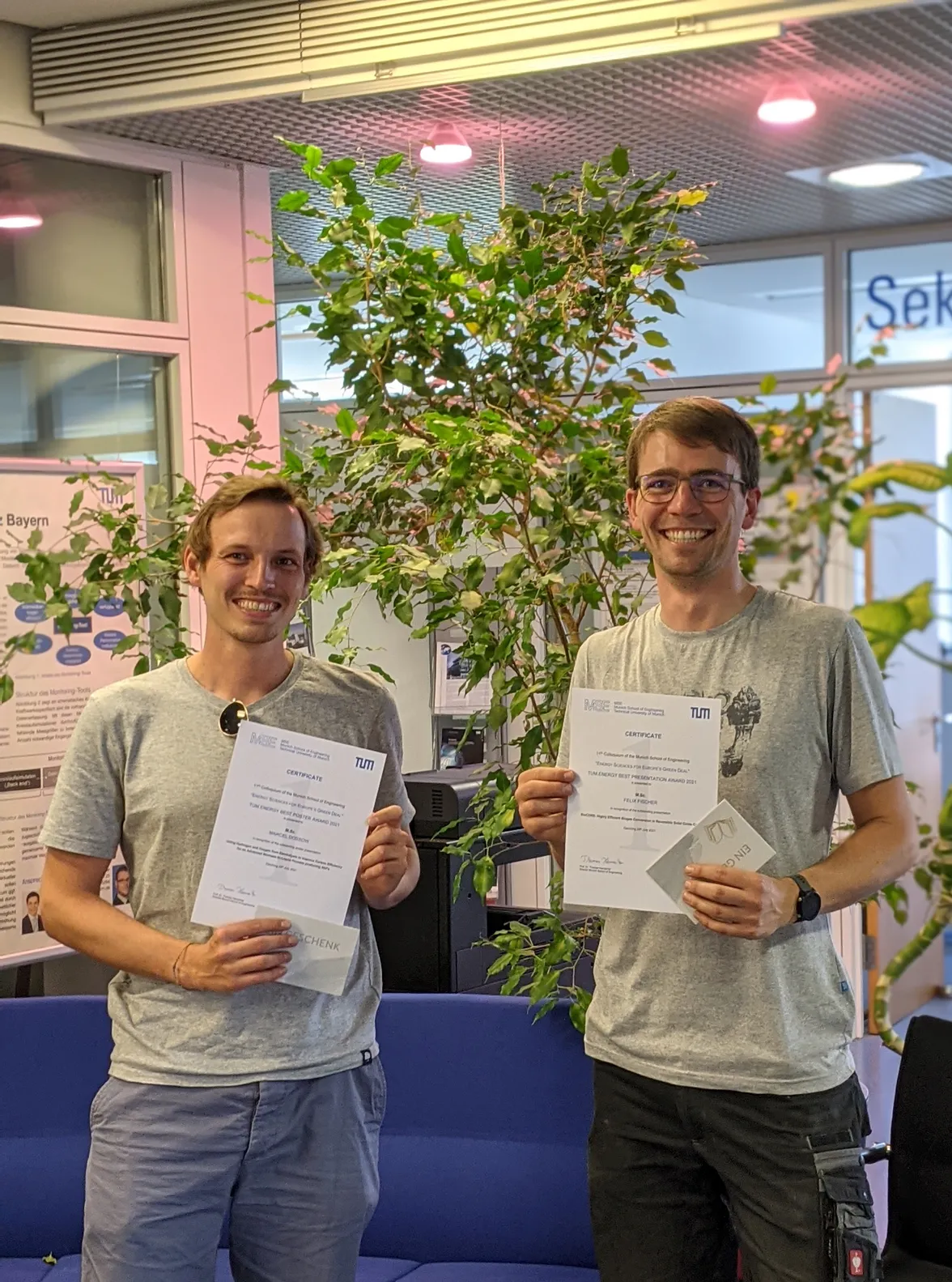
Website for EU research project TWIN-PEAKS now online
The website of the EU project TWIN-PEAKS (Twinning for Promoting Excellence, Ability and Knowledge to Developed Advanced Waste Gasification Solutions) is now officially available (Link). The Chair of Energy Systems is pleased to be part of the EU research project and to work together with the Lithuanian, Swedish and German partners on waste and residue gasification technologies of the future. As part of the research project, three core research areas were identified on which the joint research of the consortium is now focused: plasma-assisted gasification processes, plasma-assisted methanation and the topic of input materials and usage paths for gasification process chains.
Contacts: Sebastian Bastek, Sebastian Fendt
This project has received funding from the European Union’s Horizon 2020 research and innovation programme under grant agreement No 951308. The sole responsibility for the content of this presentation lies with the authors. It does not necessarily reflect the opinion of the European Union. Neither the REA nor the European Commission are responsible for any use that may be made of the information contained therein.
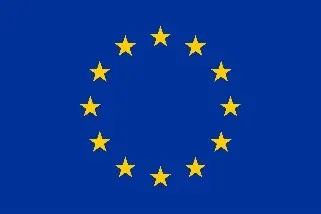
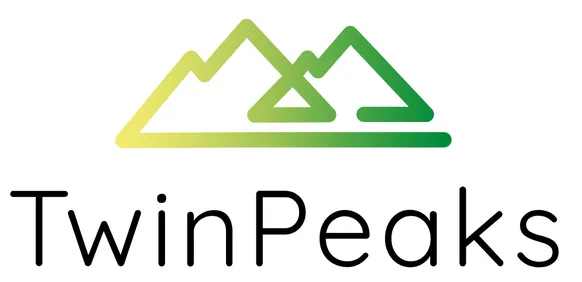
EU research project ENGIMMONIA kicks-off at 1st of May 2021
The chair of Energy Systems is looking forward to be part of the EU research project ENGIMONNIA. A total of 22 partners from industry and research with a total funding of 9.5 Mio. € are investigating the decarbonization of the maritime sector with Ammonia as a future energy vector. Together with ORCAN ENERGY AG, the chair of Energy Systems is working on increased engine efficiency by means of waste heat utilization in ORC systems. Further information on the project and the consortium can be found here. The Project begins at 1st of May 2021 and has a project duration of 4 years.
Contact person: Christoph Wieland

